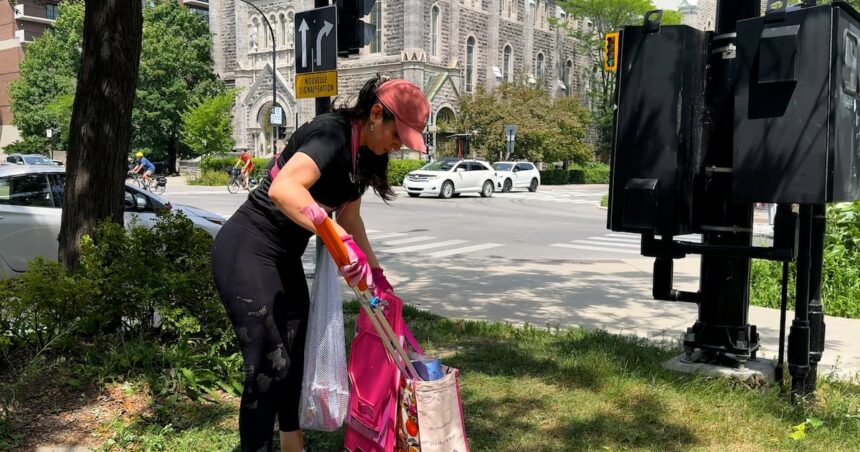The summer sun beats down on Parc La Fontaine as Michelle Desrosiers carefully picks up a discarded coffee cup and places it in her already half-full garbage bag. Dressed in bright orange visibility gear with “Trashy Lady” emblazoned across the back, Desrosiers is a familiar sight in Montreal neighborhoods these days.
“I started noticing more garbage after pandemic restrictions lifted. People were out again, but city services hadn’t caught up,” Desrosiers explains, wiping sweat from her brow. “I thought – I can complain, or I can do something about it.”
What began as a personal mission to beautify her Plateau-Mont-Royal neighborhood has transformed into a successful fundraising initiative for the Montreal SPCA, one of Quebec’s largest animal welfare organizations. For every kilometer of urban terrain Desrosiers cleans, local businesses and individual donors contribute to her campaign, which has raised over $17,000 since April.
The initiative comes at a critical time for animal shelters across Canada. The Montreal SPCA reported a 23% increase in animal surrenders compared to pre-pandemic numbers, a trend mirrored in facilities nationwide. Economic pressures, including rising housing costs and inflation, have forced many pet owners to make difficult decisions.
“People are struggling with pet food costs, veterinary bills, and some landlords still discriminate against pet owners despite provincial rental regulations,” says Jean-François Lambert, spokesperson for the Montreal SPCA. “Michelle’s work is helping us maintain essential services during a particularly challenging summer.”
Desrosiers tracks her cleanup routes using a fitness app, posting daily updates to her social media accounts where followers can watch her progress in real-time. Local businesses including Café Santropol, Dépanneur AS, and La Banquise restaurant have pledged donations based on her mileage.
“I’ve lived above my restaurant for twenty years and never seen someone so dedicated to community cleanliness,” says Martin Picard, owner of a participating eatery. “When she approached us about supporting the SPCA through her work, it was an easy yes.”
The project has struck a chord with Montrealers across different neighborhoods. City councillor Alex Norris praised the initiative during a recent borough meeting, noting: “This shows how individual action can address multiple community needs simultaneously.”
On a practical level, Desrosiers’ efforts have yielded impressive results. By her count, she’s collected over 340 bags of garbage from city streets and parks since spring. The most common items? Coffee cups, cigarette butts, and sadly, pandemic-era disposable masks that continue to litter urban spaces.
“The first week was honestly disgusting,” Desrosiers laughs. “But now I have a system. Heavy-duty gloves, proper tongs, and I know which areas need the most attention.”
The initiative has sparked impromptu community cleanups, with neighbors and supporters occasionally joining Desrosiers on her routes. Local schools have taken notice too, with three elementary classes organizing their own “mini trashy” events before summer break.
Quebec’s Environment Minister Benoit Charette acknowledged the project on Twitter last week, writing: “Citizenship at its finest – addressing urban cleanliness while supporting animal welfare. Merci Michelle!”
According to Humane Canada, animal shelters nationwide are experiencing capacity challenges following post-pandemic pet surrenders. The organization reported that adoption rates dropped 15% in the first quarter of this year while intake increased by nearly 20% across member shelters.
“What Michelle is doing provides dual benefits,” explains Sophie Gaillard, animal advocacy director at the Montreal SPCA. “Beyond the financial support, she’s raising awareness about our services when we need visibility most.”
For Desrosiers, who owns two rescue cats herself, the connection between environmental stewardship and animal welfare feels natural. “Healthy communities should be clean for everyone – people and animals alike.”
The initiative has already inspired similar efforts in Quebec City and Sherbrooke, where local residents have launched their own cleanup fundraisers for animal welfare organizations.
As summer progresses, Desrosiers has expanded her routes beyond her home borough, recently cleaning areas in Verdun and Hochelaga-Maisonneuve. She hopes to reach $25,000 in donations before fall arrives.
“The best part is the conversations that happen when people stop to ask what I’m doing,” Desrosiers says, emptying her collection bag into a public bin. “It’s a chance to talk about both city cleanliness and animal welfare – issues that might seem separate but actually connect to how we care for our shared spaces and those who depend on us.”
For those interested in supporting the initiative or starting similar projects, the Montreal SPCA has created a dedicated webpage outlining Desrosiers’ routes and contribution options. The organization also offers guidance for other communities looking to establish comparable programs.
As Montreal’s “Trashy Lady” continues her daily rounds, she reminds us that meaningful community impact often begins with the simplest of actions – in her case, picking up one piece of litter at a time.






